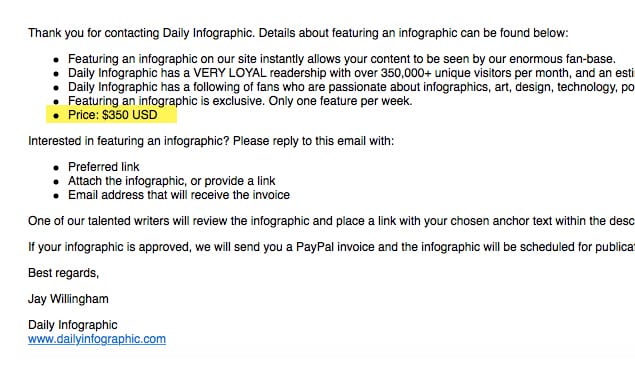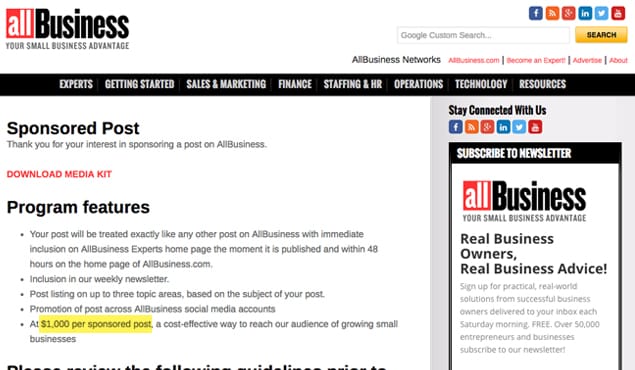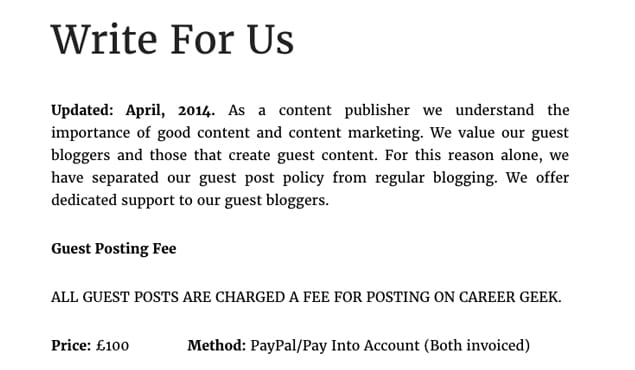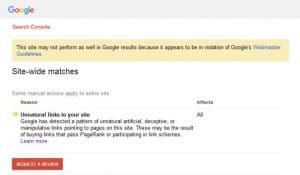The question in the title here brings up a lot of interesting questions, financial and moral. It all comes down to your perspective, the value you assign to a guest post, and how much you care about the industry around you.
There are three potential options for a financial transaction involving a guest post. You can be paid to have your post published, you can pay to have your post published, or there can be no monetary exchange at all. Each of these perspectives has its benefits and drawbacks.
Why Do You Post?
In order to determine which of these trains you’re on, you need to figure out why you’re writing guest posts in the first place. Are you doing it for the money, for the name recognition, for the link and traffic?
If you’re guest posting for money, it’s hardly even guest posting; you’re just a paid writer. It’s a more precarious position than getting a constant job with a site or two, since you have to pitch individual posts and don’t have assignments or a job. However, it’s a simpler, easier world to live in, when you don’t have to care about links, traffic, or even necessarily your name.
If you’re posting for the traffic and links, as well as the name recognition, a guest post has more value to you. Often you will be willing to write a post for free, because the value of the link and the traffic is worth it. In fact, many sites consider it a sort of free exchange of value, no money needed. You get the link and the exposure, and they get content they didn’t have to produce. It’s a win/win scenario for most sites.
Some few sites take the opposite perspective. They consider themselves too “high class” or too valuable to simply give away that value. They make you pay to get your post published. Some sites, in fact, charge just to submit a pitch, and won’t return the money if they decline to publish what you’ve pitched.
Money as a Filter
The idea of charging for a guest post submission is nothing new, and some sites that are legitimately worth posting on will do it as a way of filtering the submissions they get. See, when you open up your site to guest posts publicly, you end up getting an immense number of absolutely terrible submissions. No matter how prominently you promote your guidelines, people will always try to just throw whatever they have at you. You’ll get dozens of emails each week with pitches written in broken English, form letters from sites trolling for submissions, and entire articles that need so much editing that they’re more work than just creating content from scratch.
By making people pay to submit a guest post, this gates off the low quality submissions. Sites going around trolling for links aren’t going to want to pay for them.
The only other way to do a filter that is at all effective is to make it a more exclusive club. Limit the ability for people to pitch a guest post to only those people who are, say, enrolled in a course, or who are owners of sites with X amount of traffic. ProBlogger changed to an invitation-only model a few years back, for example.
On the one hand, money is a simple and adequate filter for most purposes, and it’s a lot less work than maintaining a list of approved bloggers like ProBlogger is doing. On the other hand, it doesn’t make your site all that much more valuable; people know that the posts published on your site are there because someone paid for them to be there, not because of any innate quality. ProBlogger, meanwhile, has a lot of great reputation attached to it. Being featured on ProBlogger means you were invited to post there, presumably because your post quality and your site reputation. This means the post gives you even better name recognition and exposure than it otherwise might.
Money and Reputation
There’s a problem with paying to submit a guest post, and that’s the reputation that comes along with it. The general thinking is that you shouldn’t pay to have a guest post published, and it becomes a bit of a cyclical prophecy. There are good reasons not to pay for publication, but primary among them is the bad reputation of sites that require payment for submissions. The bad reputation comes from a history of scams.
Now, the scam is not a new thing. It goes back to old literary magazines and other print publications. Magazines would often charge for consideration, with the assumption that the money was used to cover the overhead required to filter through and read all of the submissions. Some magazines still do so today, and some of those magazines are well-regarded in their industries as excellent publications. It would be as if Forbes charged for you to submit a guest post; people would do it, happily, because Forbes is a great place to be published.
The scam was all of the small, no-name magazines that charged and had little or no intention of publishing anything they received. Rather than use the money to cover overhead, it was pure profit; they didn’t even read their submissions, and instead purchased ghostwritten content and published it under pseudonyms. All of those submissions went into a black hole, and the writers on the other end would only receive a form letter rejection, if anything.
This was a lot harder to detect back before the age of the internet, when you never knew anyone else who submitted to the same magazine, let alone anyone who was successfully published in it. Plus, some of them might have more or less randomly accepted people to get some positive press.
The same model continued when the internet showed up and blogs became the modern equivalent to web magazines. Some great sites charge for consideration, while many others tried but had little intention of doing anything with the submissions.
Interestingly enough, the internet has changed the magazine industry in this regard. While magazines that made the transition to the internet quickly discovered there was little reason to charge for submissions, and in fact it alienated many good writers, charging for submissions dropped. Meanwhile, in print, it increased, because magazines were losing subscriptions and business to the web, so they needed to make money somehow.
The Scale of Payment
One way you can know whether or not a fee for submission is reasonable is by how much it costs. Most magazines and websites that charge for consideration, if they’re on the legitimate site of things, are only going to be charging $5 or so. Many magazines limit their charge to $2 or $3. It’s meant to be a small “tax” to cover overhead, and a filter for people who know their content won’t pass muster.
Meanwhile, sites that charge $10, $20, $50 or more are doing it to rake in money off the people looking to submit their content, not to use it as a filter or to cover costs. The problem with these sites is this practice often tends to be their business model as well. Rather than a small fee for consideration, paying for the editor’s time, they charge a larger fee and guarantee publication. These sites will charge you $25 to get your post published, but they’re guaranteed going to publish it.
This starts to come back to the value you assign to the links, traffic, and name recognition you get from these posts. I would assume you are only willing to spend that much money on a publication if that publication is going to give you some good quality traffic and a great link. However, by the very nature of pay-to-play services, you’re not getting that. The sites that charge that much are more like content aggregators, with low SEO value. You’re putting your content on a site with who knows what other kinds of content, generally of low quality. It doesn’t give you the value you would want to be paying for.
Hurting Others
In the world of writing, particularly in the world of freelance writing – of which guest posting can be considered a branch – there is a constant fight to keep writers from being exploited. Companies are notorious for pushing the narrative that writing isn’t worth much, because “anyone can do it,” despite the fact that high quality writing is a skill people go to school for and get Masters or PHDs in.
This fight takes many forms. Some people choose to spread awareness. Some people educate their fellow writers and artists. Some people get more direct with fighting the brands and companies that exploit writers.
Some people would say that paying for consideration is a form of exploitation. Most writers paying for consideration are not going to be published. From the perspective of the writer it becomes a waste of money the majority of the time. If you’re able to get valuable feedback from an editor, or if you’re able to make a connection for the future, it works out better.
The value of a post on the web in terms of SEO makes this all that much murkier. If you assign value to the link and to the nebulous traffic you get, you might be tempted to consider yourself “paid” for your writing. On the flip side, as that Twitter above shows, a lot of people and companies then get big heads and believe creating content for their site is value in itself.
Sure, I can see Forbes, or VentureBeat, or the Huffington Post, or another big name site having exposure that matters. The problem is, everyone gets this idea that just because they have a brand, means that their brand matters. They try to pay people in their exposure, when the exposure they bring to the table is virtually meaningless.
Think about it this way; if you’re paying $25 for a guest post, how much traffic is that post going to bring in? How valuable is that link? Now compare that to spending $25 on paid ads on Facebook or Google. With sufficient targeting, you can bring in a hell of a lot more traffic, all of which is more likely to be interested and convert. You don’t get the name recognition or the permanent link, but the immediate value is much better.
You have negative pressure from two sides, then. The websites charging for submissions tend to overestimate the value their links and posts will provide, and in some cases – as in content aggregators – the actual value is near zero. At the same time, other people will see your content on such sites and will know you don’t have the self-respect to only post on high quality sites.
Should You Pay To Submit a Guest Post?
So, let’s actually answer the question, shall we? Let’s go through each of the three possible situations from each side of the transaction.
As a blogger:
- Should you publish guest posts on a site that pays you for them? Heck yeah! Making money, getting the post, getting the exposure; this is basically the best deal. The only reason you would want to avoid this is if the site paying you is low quality or could hurt your SEO by being out of industry.
- Should you publish guest posts on a site that neither charges nor pays? Sure! This is what most sites do these days, and while you might not always get a lot of value from each individual site and link, they can build up over time into a powerful force in SEO.
- Should you publish guest posts on a site that charges for submissions? Probably not! The only time you want to consider this is if the site is huge and high quality, and only if the charge is low. I personally would never recommend paying more than $5 or $10 for a submission fee.
As a site owner:
- Should you pay guest authors publishing on your site? Sure! It’s a good way to get more exposure as you’re added to lists of sites that pay, and you’ll be able to forge relationships with high quality bloggers around the web. You just have to be aware of the work it takes to filter through all of the content submissions you’ll receive.
- Should you publish guest posts without paying or charging for them? Sure! Again, this is the way most sites work. You won’t attract an excess of writers, and some will refuse to write for you because they’re used to selling their content, but you’ll still attract a good number of good writers.
- Should you charge a submission fee for posts you publish on your site? Probably not. You can if you absolutely need to, but it’s going to give your site a worse reputation than it might otherwise have, and you’ll turn away many good writers.
In the end, the quality of the content matters more than anything. Don’t cut any corners, and write content that is going to be valuable to people, instead of just trying to get a quick paid link. These posts will perform better and will carry more SEO weight behind them.
 ContentPowered.com
ContentPowered.com








